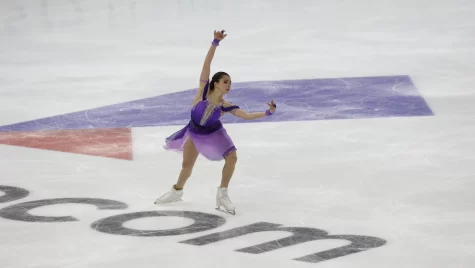Olympics permit Kamila Valieva to compete
Russian figure skater tests positive for banned heart medication after breaking world record
In figure skating’s team event last week, Valieva became the first female skater to land a quadruple jump at the Olympics, and her performances in the short program and free skate helped the Russian Olympic Committee win the gold medal. The International Testing Agency (ITA) confirmed that she tested positive on Feb. 8 for the banned substance trimetazidine, a heart medication, from a test taken in December. Medals were delayed as the Olympic committee debated whether she should receive the gold medal she earned. (Ice rink photo courtesy of Wikimedia’s Creative Commons.)
February 24, 2022
Valieva breaks world records, first woman to land quadruple jump at Olympics
Russian figure skater Kamila Valieva stands as the first woman to land a quadruple jump at the Olympics – at just 15 years old.

In the figure skating’s team event, Valieva became the first female skater to land a quadruple jump at the Olympics. Her performances in the short program and free skate also helped the Russian Olympic Committee win the gold medal.
The gold medalist landed two quads in the team free skate competition in Beijing, finishing with a 178.92 score – 30 points ahead of second place figure skater Kaori Sakamoto. Valieva is one of nine female figure skaters at the Beijing Winter Olympics competing for the Russian Olympic Committee – otherwise known as the ROC.
On Dec. 9, 2019, the World Anti-Doping Agency (WADA) banned Russia from all international sports for four years, after it was found that data provided by the Russian Anti-Doping Agency had been manipulated with a goal of protecting athletes involved in Russia’s state-sponsored doping scheme. However, select Russian athletes have been allowed to compete under the ROC.
This is not Valieva’s first time winning gold. She was the champion of the 2022 European Figure Skating Championships, 2021 Rostelecom Cup winner, 2021 Skate Canada International champion, 2022 Russian national champion and 2021 Russian National silver medalist, as well as a 2022 Olympics gold medalist.
So far, Valieva has set eight world records. At the 2021 Rostelecom Cup, a senior-level international competition series, Valieva became the first woman to break the 270 points barrier for the total score. She also broke world records for overall scores at 2021 Skate Canada, 2022 Europeans and 2021 CS Finlandia Trophy.
However, the International Testing Agency (ITA) confirmed that she tested positive on Feb. 8 for the banned substance trimetazidine, a heart medication, from a test taken in December. Medals were delayed as the Olympic committee debated whether she should receive the gold medal she earned.
Students from PISD voiced their opinions on the issue.
“I think it’s unfair that they justified Kamila being able to compete again after a second failed test taken just a week later,” sophomore Mackenzie Ciancia said. “She shouldn’t be allowed to compete more this year, however, I understand that the decision was made due to the fact that she’s under 16 according to WADA doping codes.”
Trimetazidine and the positive test
Trimetazidine (TMZ) is a drug used to treat angina and other heart-related conditions. It increases blood flow to the heart, and limits rapid swings in blood pressure. It is illegal for athletes to use, as it can increase blood flow efficiency and improve endurance.
Valieva was suspended after trimetazidine was found in her system, but the skater appealed that decision the next day. In the hearing, Valieva’s attorney, Anna Kozmenko, claimed the 15-year-old accidentally took trimetazidine through a contaminated product. Kozmenko argued the drug belonged to Valieva’s grandfather, who takes it for heart issues.
“There can be completely different ways how it got into Valieva’s body,” Kozmenko said in the hearing. “For example, her grandfather drank something from a glass, saliva got in and this glass was somehow later used by the athlete.”
Andrey Zholinsk, director of the Federal Research and Clinical Center for Sports Medicine and Rehabilitation of the Federal Medical and Biological Agency, said the lawyer’s story seems “wild” because TMZ is packaged in a film-coated tablet, and does not leave traces on glass cups or bottles.
However this is not the first time trimetazidine has been used at the Olympics. In 2014, Chinese swimmer Sun Yang – a three-time Olympic champion – served a three-month ban in a ruling that was initially not published by China’s anti-doping agency.
At the 2018 Winter Olympics, Russian bobsledder Nadezhda Sergeeva tested positive for trimetazidine and was disqualified.
Valieva was cleared to skate because she is considered a “protected person” under WADA’s doping code by being under 16. Although she can skate, the investigation will continue for months, and she may be stripped of medals later.
The International Olympic Committee announced no medals will be handed out in events that Valieva places in until the full investigation is completed.
A History of Doping: Coach Eteri Tutberidze, the “Snow Queen”
Eteri Tutberidze, the head of Valieva’s coaching team, is one of the sport’s most prominent trainers and most polarizing figures. Known for her curly blonde hair and steely resting face, Tutberidze is known in Russia as the “Snow Queen.”
Tutberidze has reaped success since the 2014 Olympic Games, where her student, Yulia Lipnitskaya, won gold in the team event. Since that breakthrough, her students have claimed two more Olympic medals, gold and silver for Alina Zagitova and Evgenia Medevedeva, respectively.
Tutberidze’s notably strict training approach has raised concerns about the treatment of her young female students – including her attitude regarding injuries and eating disorders.
Tutberidze’s young students have succeeded in international figure skating competitions, but their phenomenal success, yet short careers, have underscored the cutthroat nature of Russian women’s skating. Many of the young figure skaters that Eteri has trained have careers as short as two years.
Tutberidze said she believes the price of training is worth the glory of victory. She has also said she monitors skaters’ weight because of the demands of what they are trying to do. Eating disorders are common among figure skaters, as it is a demanding sport that requires athletes to look and perform their best.
“Tutberidze keeps her little girls under tremendous pressure,” coach Alexander Volkov said to RIA Novosti. “They do whatever she says. If she tells them to do a quintuple jump, they will go. They will break, but they will go. She squeezes out of them everything she can squeeze out.”
Alina Zagitova, 19-year-old Russian figure skater and Pyeongchang gold medalist, said that Tutberidze restricted her own food intake, and wouldn’t even let herself drink water at the Olympics. “We just rinsed our mouths and spit it out,” Zagitova said in 2019, when she was 16-years-old at the time.
Tutberidze has also said that she believes in transparency. Others can flatter her skaters, she said. She prefers the truth.
“The truth, as it is, they will hear only from me,” Tutberidze said in Dec. 2021. “If our athletes are good, they will be welcome everywhere. If they are bad, then no one needs them.”





















